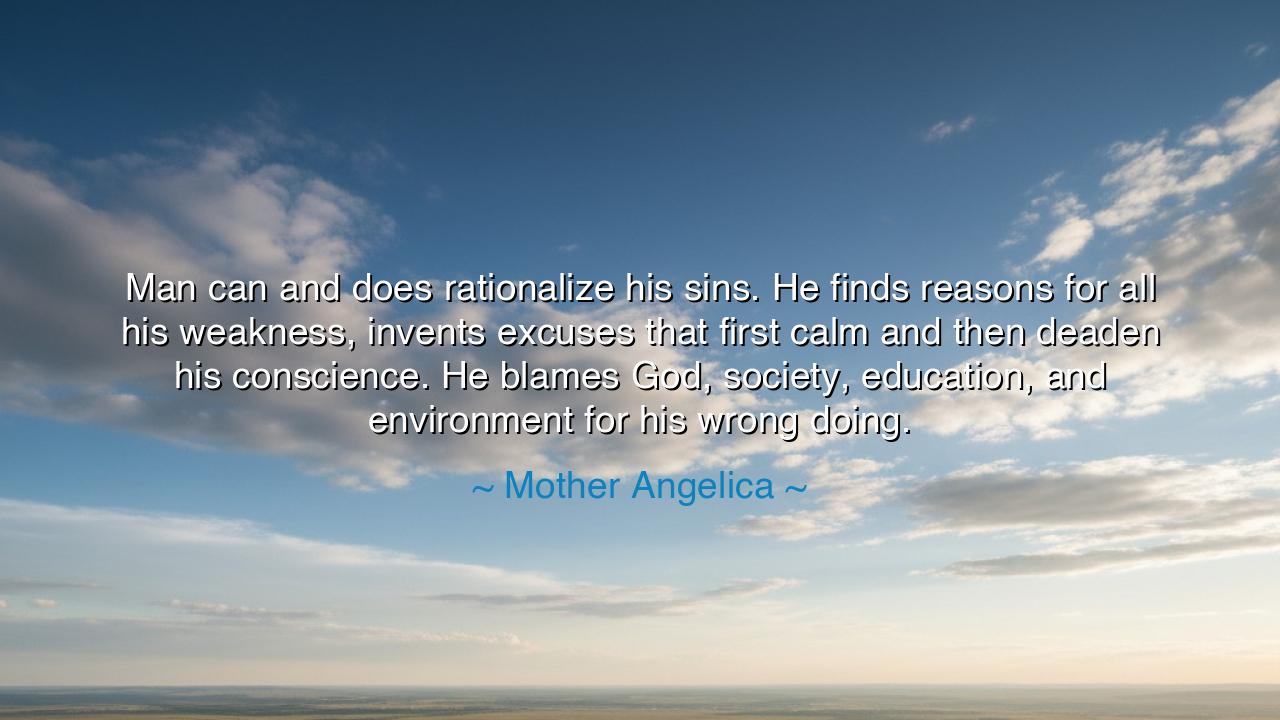
Man can and does rationalize his sins. He finds reasons for all
Man can and does rationalize his sins. He finds reasons for all his weakness, invents excuses that first calm and then deaden his conscience. He blames God, society, education, and environment for his wrong doing.






The wise and steadfast Mother Angelica, a woman who spoke truth with both gentleness and fire, once declared: “Man can and does rationalize his sins. He finds reasons for all his weakness, invents excuses that first calm and then deaden his conscience. He blames God, society, education, and environment for his wrongdoing.” These words, though uttered in modern times, bear the weight of ancient moral law — for they speak of the eternal struggle between truth and self-deception, between the voice of conscience and the whisper of pride. In her insight, Mother Angelica lays bare one of the deepest flaws of human nature: our endless capacity to justify what we know to be wrong.
To rationalize sin is to construct a false temple of reason around an idol of desire. The sinner, unwilling to face the mirror of his own actions, builds arguments to make guilt seem noble and wrongdoing seem necessary. The heart deceives itself with ease, whispering, “It was not my fault — the world made me so.” Yet every such excuse is a brick in the wall that separates the soul from truth. The first deception soothes; the second hardens; the third corrupts. And in time, as Mother Angelica warns, the conscience itself — that divine spark of discernment — grows silent. The man becomes numb to his own fall, walking in moral darkness yet believing himself righteous.
This truth was known to the ancients as well. In Plato’s Republic, Socrates described how ignorance of the good leads men to do evil while believing they are justified. Similarly, the Stoics taught that man’s greatest battle is not against others but against the lies he tells himself. The origin of Mother Angelica’s thought lies in this same tradition — the belief that conscience, when ignored or manipulated, loses its strength. Once the inner voice of truth is drowned by excuses, the soul drifts without compass. What begins as weakness becomes habit, and what was once shameful becomes accepted.
History too bears witness to this tragedy. Consider King David, who, blinded by desire, took another man’s wife and arranged the husband’s death. He reasoned, perhaps, that as king he was above reproach, that the laws binding others did not bind him. But when confronted by the prophet Nathan, his rationalizations collapsed, and his soul was exposed. Only then did he see that sin thrives where excuses are born, and only confession restores the light. In David’s fall and repentance, one sees both the warning and the hope in Mother Angelica’s words — that justification leads to ruin, but truth leads to redemption.
Her warning also resounds in our modern world, where it is easy to blame society, education, or environment for every fault. The thief blames poverty; the corrupt blames the system; the indifferent blames the times. And yet, as Mother Angelica saw clearly, such blame is an escape from responsibility. Education may shape the mind, society may influence the heart, but no external force compels the will to do evil. The final decision — to act rightly or wrongly — always belongs to the self. To deny this is to deny our own dignity, for free will is the crown of humanity.
At the heart of her quote lies not condemnation, but mercy. She reminds us that rationalization is the enemy of repentance. As long as we justify our sins, we cannot be healed of them. But the moment we face them honestly — without excuse, without disguise — we allow grace to enter. The conscience, once deadened, can awaken again. Truth may wound, but it also cleanses. Like a physician who cuts to remove infection, the acknowledgment of guilt is the first act of healing. Thus, to live truthfully is the beginning of freedom.
The lesson of Mother Angelica’s wisdom is clear: do not seek comfort in excuses, for they are the soft chains of the soul. Look upon your failings with courage; name them, and they lose their power. Hold yourself accountable before blaming the world, for integrity is not given — it is forged in self-honesty. The conscience, though it may sleep, is never truly dead; it can be rekindled by humility and truth.
So let her words be a lamp for every generation: a man who excuses his sin imprisons himself, but a man who admits it begins to walk toward freedom. Resist the temptation to rationalize. Choose truth over pride, repentance over comfort, responsibility over blame. For in the end, only those who face their own weakness with courage shall rise strong — and walk upright in the light of wisdom and grace.






AAdministratorAdministrator
Welcome, honored guests. Please leave a comment, we will respond soon